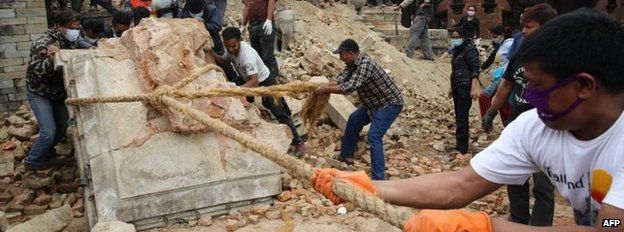Towns and villages near the epicentre of Saturday’s earthquake in central Nepal have suffered “almost total devastation”, the Red Cross says.
Assessment teams say they have found survivors in a “desperate situation”.
Nepal says 6,204 people are known to have died in the 7.8-magnitude quake and 13,932 were injured.
But the fate of thousands more in many remote areas remains unknown and the government has warned that the death toll could rise to more than 10,000.
Although rescue teams from Nepal and the international community are operating in the capital Kathmandu and the surrounding area, landslides and poor weather have hampered efforts to reach isolated districts.
The home ministry says that 20 helicopters carrying relief have landed in the districts of Sindhupalchok, Dolakha, Rasuwa, Nuwakot, Dhading and Gorkha.
But correspondents say that there is a severe shortage of helicopters, and although China is expected to send more, Nepal has appealed to other countries for further aircraft.
The United Nations on Wednesday launched a “flash appeal” for $415m (£270m) to assist Nepal over the next three months – but on Friday it told the BBC it had so far received only $5.8m – 1.4% – in confirmed funding.

At the scene – Sanjoy Majumder, BBC News, Kathmandu
At Kathmandu’s historic Durbar Square soldiers and volunteers form human chains to remove the debris, brick by brick.
The bricks come from temples and other historic buildings levelled by the earthquake. Many are very old and are being stored so that they can be used to rebuild these ancient sites.
The soldiers are joined by aid workers – but also tourists. One French visitor said she “just wanted to help”. But it’s an ad hoc approach which characterises the entire relief operation.
I met rescue and medical teams from France and China. After wandering around they left. “We don’t know what we are supposed to be doing,” one French rescue worker told me.
Their services are required in the remote villages where many are in urgent need of assistance – but they are stuck here in the capital because no-one is telling them what to do.
Immediate cremations
There has been growing anger at the government’s response to the disaster, with a number of protests breaking out.
The home ministry said on Friday that rescue and relief operations in Kathmandu would focus on devastated pockets of the city including the areas around the central bus terminal and around historic monuments – where there is a small chance people remain trapped in several collapsed tall buildings.
Searches will also be conducted for survivors around historic monuments in the ancient towns of Patan and Bhaktapur.
The tent cities which sprang up around Kathmandu in the days following the quake have almost gone, reports say, as the fear of aftershocks subsides.
But the stench of rotting bodies in the rubble has driven officials to order that unclaimed bodies be cremated immediately after they are recovered, Reuters news agency reported.
BBC
 Q FM Africa's Modern Radio
Q FM Africa's Modern Radio